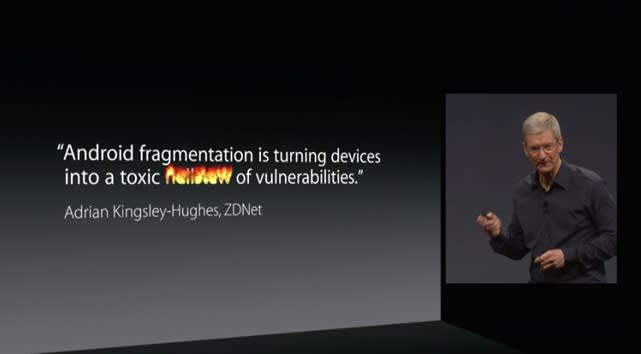Google's Sundar Pichai rebuts accusation that Android is a "toxic hellstew" of vulnerabilities, likens Apple to Mercedes Benz

With Google's I/O conference set to get underway on Wednesday, Bloomberg Businessweek earlier today put up an interesting and sweeping profile of Sundar Pichai, the man Larry Page tapped to run Android following the departure of Andy Rubin.
An extremely talented engineer seemingly beloved by many, Pichai isn't afraid to speak his mind, even if it means tossing a bit of praise towards Apple.
When asked to comment on Apple CEO Tim Cook's WWDC comments regarding Android being a "toxic hellstew" (a phrase Cook referenced from a ZDNet article) as it pertains to malware and fragmentation, Pichai conveys what almost appears to be a bit of envy towards Apple's tried and true business strategy of vertical integration.
It must be liberating [for Apple] to wake up and think about your device, your software, and hey, 'I can even call the chipset guys and say what the chip should be,'" he says. "I have to think about building a platform and bringing as many people along on this journey and getting it right. I believe that ultimately it's a more powerful approach, but it's a lot more stressful as well."
In a separate interview, Pichai took some more time to address the issue of malware, apparently likening iOS to a Mercedes Benz in the process.
You have to be careful when you make a $100,000 Mercedes car not to look at the rest of automotive industry and make comments on it. ... We serve the entire breadth of the market, globally across all form factors, et cetera. Android from the ground up is designed to be very, very secure. ... History shows typically that malware is also targeted at the more popular operating system. So you know there is that.
Do we take security seriously? Yes. [In the Google Play app store,] we detect malware. If you are installing an app, we ask user's permission. If they say "yes," we scan it. Even if you are scanning anything outside of the Play store, we still detect and warn you if its malware. Every time I look at the data-across millions and millions of users' phones-the data is encouraging.
While Pichai is absolutely correct in stating that malware is typically designed to target the more popular operating systems, available security data still raises a number of red flags regarding Android's safety as a platform compared to iOS. As a quick example, recall a 2012 memo from the US Department of Homeland Security and the US Department of Justice which showed that just .7% of malware threats targeted iOS. Meanwhile, the memo found that 79% of mobile malware threatened Android.
More recently, a June 2013 report from Juniper Networks found that 92% of mobile malware was designed to target Android.

